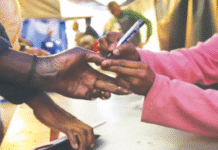“Into my heart an air that kills from far yon country blows… That is the land of lost content, I see it shining plain….”
My friend, Ali Riaz, has published an excellent piece in the April edition of Current History on “The Crisis of Democracy in Bangladesh.” It reminded me of AE Houseman’s nostalgic poem of loss — possibly of happy memories, but more likely painful ones – contentment lost through missed opportunities or bad decisions. Riaz makes the latter case linking the present political crisis to the continuation of the economic and social progress in Bangladesh.
This is the crux of the issue. The political box into which the country’s political leaders have dragged it will undoubtedly erode the enormous economic gains made by Bangladesh in the past two decades, in part by releasing political forces that have been bottled up or latent for many decades. The one-party government (the opposition is bought and paid for and Riaz describes this farce eloquently) has thrown aside what clearly the great majority of the populace saw as its mandate: to accomplish two tasks and call another election –– 1) come to an agreement with the opposition that will produce a credible second election and end the egregious violence; 2) complete the trials of those members of the Bangladesh Jamaat-i-Islami (BJI) who are accused of collaborating with West Pakistan during the war of separation.
The Awami League (AL) government appears to have chosen to ignore popular will and to be planning to stay in office without an election until 2019. Signs of this include the government doing its best to marginalise the main opposition by continuing to arrest its leaders, denying space for any political opponent to protest peacefully (media supporters of the opposition are being silenced or threatened). Pro-regime intellectuals are calling for a ‘democratic dictatorship’ (an oxymoron that we have heard before from authoritarian regimes around the world), human rights abuses are increasing (especially enforced disappearances and extrajudicial murder), and AL party leaders are thumping their chest over wins in the later rounds of local elections despite their overt ballot stuffing.
By 2019, at the rate these things are proceeding, there will not be much of the regular opposition left to run against a powerful AL-controlled government. Nor will a civil society third force, the much-talked about and hoped-for panacea of the liberal secular centre-right, develop in such an atmosphere. And if threatened, the AL might proceed to the next logical step, i.e. a one-party state to eliminate any possibility of an opposition.
Interestingly enough, the AL came to power (and was supported by India) on its platform of ridding the country of extremism. But Riaz (along many other observers) believe that the government’s clearly authoritarian mindset and increasingly authoritarian actions, will ‘encourage the extremists’. He is right and I know he meant ‘extremists’ in a broader sense. Yes there remain some extremist (militants) in Bangladesh, and the government’s actions will surely stir them up and add to their recruiting message. But there are extremists that are not militants, and they are not just more numerous, but also more dangerous. These are the extremists within political parties — both major parties — who will drive their leaders to more extreme measures in order to keep the government in power or to bring the government down (extremists in the opposition party who may be driven underground) and may see no other option but the use of increased violence to do so.
Ironically, it is the party that the AL has sworn to destroy that may be its biggest threat. The BJI is waiting in the wings. Its reputation for honest and efficient governance is drawing Bangladeshis who are fed up with the corruption and nepotism of the major parties, and it made surprising gains in the early rounds of the local elections before the ballot-box stuffing started. One wonders whether a reborn, renamed, reformed BJI, if able to shed its collaboration image, might turn into the centre of the opposition. I do not believe that its scriptural philosophy would appeal to the bulk of Bangladeshi voters, but if this renamed party ran on a platform of efficient and honest government, it might sweep the table. I hear that some of those Bangladeshis who oppose the AL government are asking already: “Where else could we go?”
Source: Tribune










